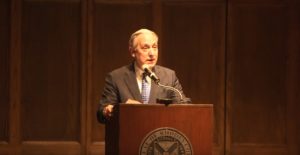
The Jewish Federations of North America announced at its virtual General Assembly on Oct. 3 a new priority for the Jewish community both locally and nationally: security.
The JFNA revealed a $54 million LiveSecure campaign to help Jewish communities across North America secure their institutions against rising antisemitism. JFNA President and CEO Eric Fingerhut said the campaign will offer $18 million per year to Jewish Federations around the nation over the next three years.
The Jewish Federation of Greater Philadelphia, for example, can apply for however much money it thinks it needs. But to receive the money, Jewish Federation would have to match the grant at a 2-1 rate.
The nonprofit organization could then distribute the money to community institutions like synagogues and child care centers. It would have to go toward security expenses.
“It’s not always going to be armed security,” Fingerhut said. “It could be security plans and cameras. There are a huge range of things we’re talking about.”
The JFNA’s goal is two-fold: to help communities that don’t have security programs build them and to help ones that do, like Philadelphia, expand them. The LiveSecure campaign is going to last three years because both processes will take time, Fingerhut said.
Fingerhut called security “a permanent new cost to the Jewish community.”
“It’s impossible for me to think that we’re going to go back to a day when we don’t have to worry about physical security,” he added.
Antisemitic incidents in the United States have surged since 2016, reaching a record-high of 2,107 in 2019, according to Anti-Defamation League numbers. The ADL began tracking attacks on American Jews in 1979.
In 2018, a synagogue shooter in Pittsburgh killed 11 people, the deadliest attack on the American Jewish community in history. Similar attacks followed in Poway, California; Monsey, New York; and Denver.
Locally, a woman started shouting antisemitic obscenities last month outside a Yom Kippur service in Lower Merion. The synagogue’s private security officer stopped her from gaining entry to the service.
“You don’t know all the attacks that have been thwarted,” Fingerhut said. “This is real.”

Before the mid-2010s, it wasn’t quite like this for American Jews, Jewish Federation CEO Michael Balaban said. There were antisemitic incidents, to be sure. But for the most part, Jews felt safe in their synagogues and schools.
Balaban traced that feeling back to World War II. The United States beat the Nazis and, in the aftermath, did a great job of clamping down on antisemitic rhetoric in public spaces.
But the rise of technology and the internet, for all their benefits, also offered antisemites a megaphone and a platform. And then the digital world started spilling over into physical reality.
Balaban pointed to the 2017 white supremacist rally in Charlottesville, Virginia, as a moment that forced Jews to confront the new harsh reality. Antisemitism emerged not just into physical reality, but onto Main Street America.
And since that horrific event, Balaban said, national politicians on both the right and left have failed to tame antisemitic extremists in their ranks. Party leaders continue to allow those elected leaders to “use Israel as a wedge to splinter us apart,” Balaban said.
So online, the problem continues unabated, he added.
“This is happening every day with kids who are joining these white supremacy groups,” Balaban said.
Balaban credited the JFNA with focusing on a “paramount” and “vital” issue because while he has resources, he also needs help. So do the hundreds of other Jewish communities in North America.
“You don’t want someone leaving your house to attack the neighbor next door,” he said. “By working together as a national network, we can combat the rise of hate.”
Both Balaban and Fingerhut said it’s a shame that the Jewish community needs to focus so heavily on security. They also said it’s sad that Jews can’t just feel safe in their community buildings.
But the new focus is necessary. And, in the long run, quality security may make people feel safe again.
“We’re not just going to sit back,” Balaban said.
Balaban said he is already meeting with local donors to raise enough money to commit to the JFNA’s matching program.
“We’re moving,” he said.
[email protected]; 215-832-0740






